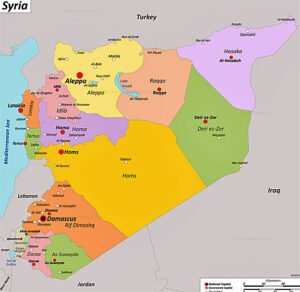Bashar al-Assad’s brutal reign and the Assad family’s 50-year dominance over Syria have come to an end. The devastating civil war has left the country fractured, its people displaced, and its future uncertain. Can Syria rise from the ashes of tyranny to build a new era of peace and unity?
BY PC Burerau
For half a century, the Assad family loomed over Syria like a storm cloud—its power pervasive, its impact seismic. From Hafez al-Assad’s calculated consolidation of control in 1970 to Bashar al-Assad’s iron-fisted response to the 2011 uprising, the Assad dynasty etched a dark legacy into the annals of the Middle East. Today, with Bashar’s departure and the collapse of Baathist rule, the curtain falls on an era marked by authoritarianism, repression, and a devastating civil war that left millions displaced and hundreds of thousands dead.
The Rise of the Assad Dynasty
Hafez al-Assad, a cunning and ruthless leader, seized power through a military coup in 1970. A member of the Alawite minority, Hafez carefully crafted an image of unity and stability, fostering loyalty within the military and secret police while maintaining a stranglehold on dissent. His rule was defined by an uncompromising grip on power, exemplified by the infamous 1982 Hama massacre, where an estimated 20,000 people were killed during an uprising by the Muslim Brotherhood.
Hafez’s reign laid the foundation for a regime that mixed secularism with brutal repression, ensuring his family’s dominance in Syria’s deeply sectarian society. His policies entrenched a system where loyalty to the Baath Party—and, more importantly, to the Assad family—was paramount.
Bashar al-Assad: The Reluctant Leader Turned Ruthless Autocrat
When Hafez al-Assad died in 2000, power passed to his son Bashar, an ophthalmologist who had spent years in London and was seen as a modern, reformist leader. Initially, there was hope that Bashar’s Western education would usher in an era of liberalization. Instead, the younger Assad tightened his grip on power, dismantling dissent with chilling efficiency.
The promise of reform quickly gave way to a regime defined by surveillance, torture, and extrajudicial killings. Bashar’s presidency became synonymous with crackdowns on political opponents and journalists, fostering an atmosphere of fear and compliance.
The Spark of Revolution
In 2011, the Arab Spring swept across the Middle East, igniting a wave of protests against authoritarian regimes. In Syria, peaceful demonstrations calling for political reform were met with violence. Security forces opened fire on protesters in Daraa, the southern city where the uprising began, killing dozens and sparking outrage.
Bashar al-Assad’s response was swift and merciless. The government deployed tanks and helicopters to suppress dissent, turning what began as a peaceful movement into one of the most devastating civil wars of the 21st century.

A Nation Torn Apart
The Syrian civil war escalated into a complex conflict involving an array of domestic and international actors. Rebel groups emerged, including Islamist factions like Hayat Tahrir al-Sham (HTS) and the Islamic State (ISIS), while Kurdish forces in northern Syria sought autonomy.
Assad, meanwhile, leaned heavily on foreign allies. Russia provided military support that proved pivotal in reversing rebel advances, while Iran supplied fighters and logistical aid. The regime’s use of barrel bombs, chemical weapons, and sieges on civilian populations became hallmarks of its strategy. Cities like Aleppo and Homs were reduced to rubble, and the death toll climbed into the hundreds of thousands.
The human cost was staggering. By 2023, the United Nations estimated that over 500,000 people had died in the conflict, and more than 13 million Syrians—over half the population—were displaced. Refugee camps in neighboring countries swelled, and Europe grappled with a historic influx of asylum seekers.
The Legacy of Tyranny
Bashar al-Assad’s regime will be remembered for its brutality, but also for the deep divisions it sowed within Syrian society. The Assad family cultivated a narrative of unity and secularism, yet their policies deepened sectarian rifts, pitting communities against one another in a desperate struggle for survival.
Internationally, Assad became a pariah, his name synonymous with war crimes. Yet he held on to power for over a decade after the uprising, a testament to the regime’s resilience and the failure of the international community to decisively address the conflict.
The Fall of the House of Assad
In the final months of 2024, as rebel offensives gained momentum and key cities fell, Assad’s grip on power finally crumbled. Damascus, the heart of his rule, was declared “free” by opposition forces, and jubilant residents tore down statues of the Assad family. Bashar’s departure marked the end of the Baath Party’s five-decade rule, leaving behind a fractured nation and a legacy of pain.
What Lies Ahead for Syria?
The end of the Assad regime opens a new chapter for Syria, but the path forward is fraught with challenges. Rebel factions remain divided, and extremist groups like HTS hold significant territory. The humanitarian crisis persists, with millions of Syrians still displaced and infrastructure in ruins.
Rebuilding Syria will require not only physical reconstruction but also reconciliation among its deeply divided people. The scars of the Assad era—decades of oppression, sectarian strife, and a devastating war—will not heal overnight.
As the world watches, the question remains: can Syria rise from the ashes of the Assad dynasty to forge a future of peace and unity? The answer will determine not just the fate of a nation, but the enduring legacy of one of the most tumultuous chapters in modern history.













